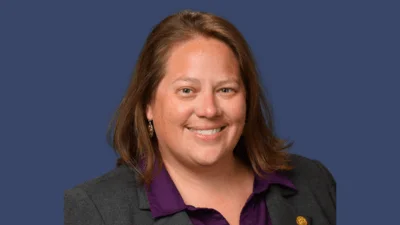The Battle Creek Area Mathematics and Science Center (BCAMSC), serving 15 school districts throughout Calhoun County, prides itself on producing college-ready, innovative thinkers who graduate ready to change the world. But as students came back to in-person learning following the COVID-19 pandemic, the staff began to notice a disappointing trend. While students were continuing to excel in the classroom, somewhere along their educational journeys, many seemed to be losing the excitement and curiosity for math and science topics that drew them to the school in the first place. In response, the building staff came together to do what they do best—innovate.
Last school year, the BCAMSC began experimenting with a new scheduling idea that would allow students time during the week to rediscover the joy of learning. Battle Creek Public Schools STEM Education Director Luke Perry said the idea was to allow students to come together each week in an advisory-like setting where they could participate in relationship-building activities while also giving them space to explore topics of interest to keep their learning relevant and fun.
“Wednesdays at the Math and Science Center are intentionally designed to be high-interest and low-impact,” Perry said. “While the classes students take here are highly engaging, we also know that the rigor can be stressful at times. We wanted to give students an opportunity to breathe in the middle of the week, while also allowing them to go a little deeper into some of the topics they’re studying so they can continue to make that connection between the classroom and the world around them.”
While the mid-week initiative doesn’t have an official name yet, it has been popularly referred as Wonder Wednesdays, which speaks volumes about how well it has been received. Mr. Perry said each Wednesday now includes three areas of focus:
- Applied learning: Students participate in experiential learning opportunities that connect to math and science concepts on a deeper level. These experiences are built and continually adjusted based on student input and suggestions. For instance, one group has been learning about advanced physics and engineering topics through drone racing this year.
- Advanced topics classes: These classes are also based on student input and feedback and include classes like Horticulture, Dendrology, and The Art of Math and Science, in which students get an opportunity to explore other interest areas while discovering the math and science concepts behind them.
- Seminar: Students come together to collaborate and participate in fun activities with their Houses (think Hogwarts, except each of the six Houses is named after a Michigan lighthouse and includes 30-40 students from all 15 schools). To begin this school year, for instance, each House took time to learn about how to be successful in school, including important discussions about battling imposter syndrome, managing stress, and successful note-taking strategies.
“I’m planning to talk about the geometric systems and equations used to create the pattern,” she said. “I also used some unconventional materials, so I’ll be explaining how I used the scientific process to brainstorm and try different methods and materials.”
Instrumental in bringing her costume together has been a class sewing machine that Casey’s teacher, Mady Gildea purchased using the BCPS Teacher Supply Grant. Funded by W.K. Kellogg Foundation grant funds, the Teacher Supply Grant offers an annual opportunity for teachers throughout BCPS to expand engaging opportunities for their students with a budget of up to $400. Ms. Gildea used the funds to purchase the sewing machine as well as some embroidery kits and several other associated supplies that have been perfect additions to the Wednesday Advanced Topics class and have opened up new possibilities for students like Sofia.
While she had always wanted to try sewing, the Art of Math and Science class allowed her the time and space to explore it. “My academic workload just didn’t allow for much free time to try it,” she said. “So, having it built into my schedule has given me a chance to pursue some of my creative interests.”
“To create is to be human,” Ms. Gildea added. “We want the students to be able to create and experiment so they can experience that humanity and experience these topics on a much deeper level.”
Since implementing the new mid-week initiative, BCAMSC staff have been presenting on its success through professional conferences and conversations with others from around the nation. According to Mr. Perry, the model has even been picked up and implemented by Raisbeck Aviation High School in Seattle.
For more information about the Battle Creek Area Mathematics and Science Center, visit BCAMSC.org.
Original source can be found here.


 Alerts Sign-up
Alerts Sign-up